Aged Desi Cow Ghee prepared from grass-fed cow’s milk has been considered a very good medium to prepare many medicines in Ayurveda. However, desi ghee usage is not limited to Ayurvedic preparations. Desi ghee has been used in Indian kitchens forever.
We have been listening to many stories and the benefits of ghee from our mothers and grandmothers. We have been eating ghee since our childhood; but there are many other usages of desi cow ghee in our life, which we are going to discuss in this article.
Cow ghee benefits are immense. It is deemed as a hurdle in our weight loss journey. Ghee is a host of health and its cooking benefits are nutritional for mind, body, and spirit. Ghee is used in tandem as a part of Ayurveda with herbal medication. Ghee has spiritual and medicinal properties as proved by the study. Ghee has recently gained traction as a healthier alternative to butter.
Scientific studies confirm its health benefits, as we know that ghee is a variation of clarified butter. It is made from milk butter, which is kept under low heat until all water content evaporates, leaving behind only solid butter. For better results again you can strain or skim off. The remaining fat is known as Ghee. As we are heating it under high temperature all nutritional qualities remain unchanged in pure form.However, the use of milk of many mammals in making ghee has been proven in history too; but Cow has been considered the sacred animal and it has religious values too. This is one of the strong reasons why cow ghee has been used mostly as DESI GHEE, in Indian cousin. Ayurveda considered only Old Desi Cow Milk Ghee as medicine.
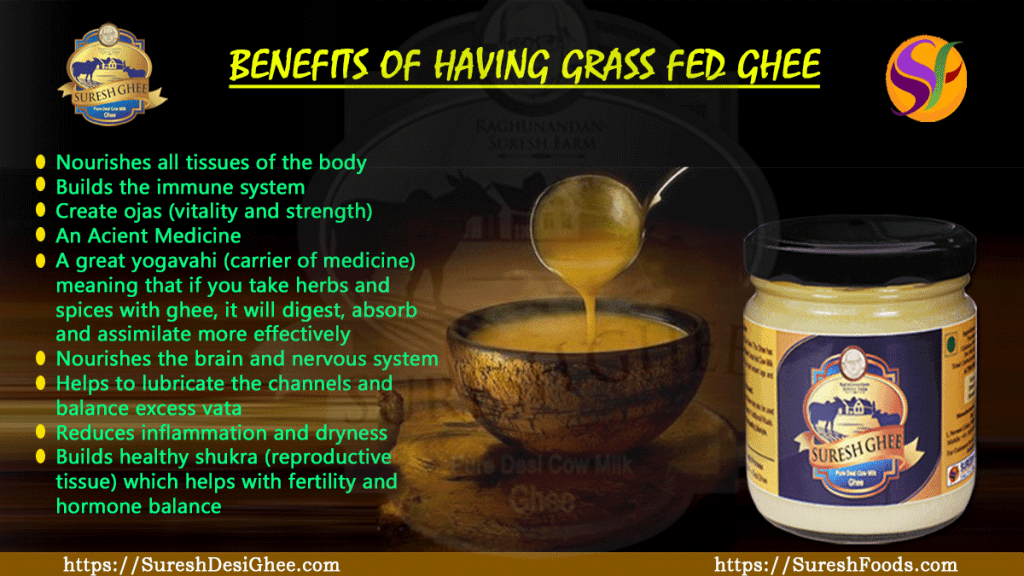
What is Cow Ghee?
Cow Ghee is prepared by grass-fed cow milk by traditional ghee making process “Bilona Ghee Making Process”. Around 60 – 65% of milk is taken from the mother cow and 40% is left for the calf. Then the milk is boiled until the colour change and fermented to make curd overnight.
In the morning the curd will be churned with wooden churners and cultured butter gets obtained. Next, this butter gets boiled in a high flame and impurities get separated from the butter. This butter oil is called COW MILK GHEE.

Buy cow Ghee Online: Order Now. Free Shipping
Nutritional Value of Cow Ghee
Cow ghee has all the necessary nutrients along with antiviral, antioxidant, antifungal and antibacterial properties. Desi cow ghee contains a high amount of saturated fat which is approximately 7.9 grams per serving. Just as all fats, cow ghee is comparatively high in calories; roughly one tablespoon of serving contains 112 calories.
According to American Heart Association’s recommendation, the total fat intake should be between 25-30% of total calories. So for a person with a 2000 calories diet, the ideal fat consumption should be between 56-78 grams, of which the saturated fat shouldn’t be more than 16 grams. A healthy body can produce its own fat, but it’s beneficial to consume a little extra ghee. Refer
Nutrition Information
Ghee is an excellent source of Vitamin E, as it is having antioxidant properties according to research. Antioxidants improve your health by reducing the risk of cancer, arthritis, and cataracts. Vitamin E also helps to reduce the risk of heart disease.
One teaspoon of ghee acquire:
- Protein: 0 grams
- Calories: 42
- Fiber: 0 grams
- Sugar: 0 grams
- Fat: 5 grams
- Carbohydrates: 0 grams
Ghee is Enriched with:
- Vitamin A
- Vitamin C
- Vitamin D
- Vitamin K
Potential Risk of ghee
As we discussed ghee is so rich in fat, you should consume it in a moderate way as it is part of a balanced diet, By considering the best dietary choices for you as it is one of the best healthier alternatives for you. Using ghee as a part of a balanced diet can help to reduce unhealthy cholesterol levels.
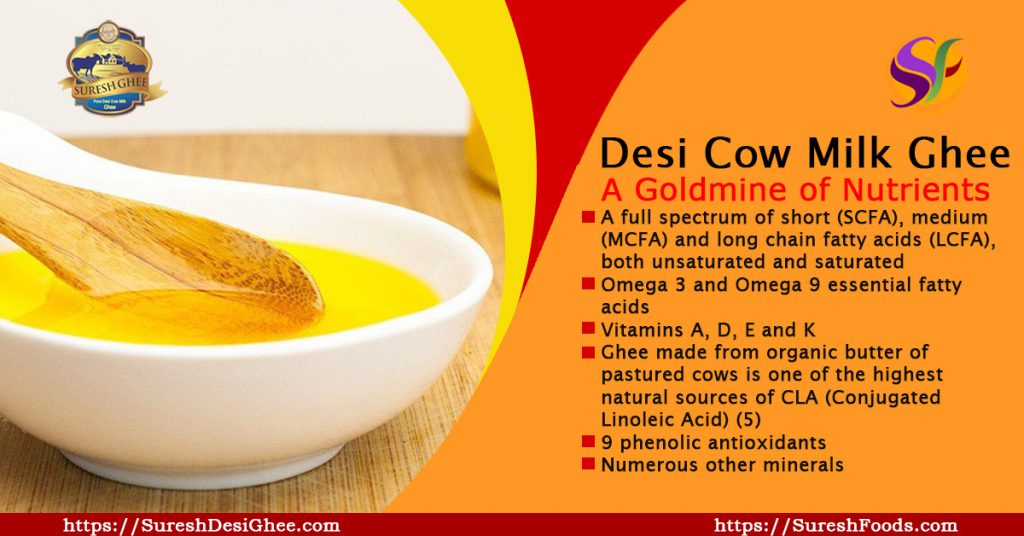
Benefits and Use of COW GHEE
- Cow Ghee has anti-aging properties that decrease bad cholesterol and facilitates excellent circulation.
- Cow Ghee provides lubrication in the body which help relief from Joint Pain
- It contains healthy fat-soluble vitamins that facilitate the absorption of nutrients in foods that are vital for health.
- The traditional method of preparing bilona churn ghee as mentioned in the shashtras, provides very deep nourishment to all of the dhatus (tissues) of the body and helps generate ojas, the most subtle material in the body.
- Cow Ghee is used in medicinal practice to help with ulcers, constipation and the promotion of healthy eyes and skin and can be used for the treatment of burns and blisters.
- Cow Ghee also helps in increasing memory, balances the mind, thus enhances brain function.
- Cow ghee contains conjugated linolenic acid which is helpful in losing weight, especially belly fat and has been known to slow the progress of cancer and heart disease.
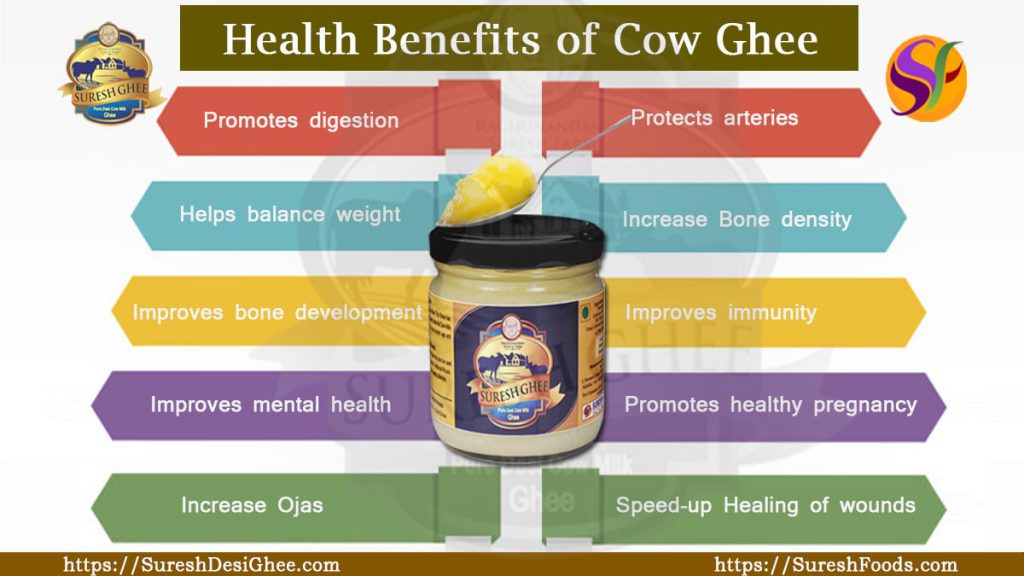
- Gir Cow Ghee melts at 37°C and our body temperature is 37.2°C, which is why it gets totally absorbed in the body while commercial ghee melts at approx. 39°C or above which increases BP, diabetes, cholesterol and other diseases.
- Intake of ghee in therapeutic doses increases appetite and gives relief from abdominal discomfort and constipation. It also reduces burning sensation and redness of eyes significantly.
- A bleeding nose, brain stroke, sinus headaches, and migraine problems get cured completely. Add 2 drops of little bit warm cow ghee in the nostrils for a few days and see the miracle.
- Body massage with ghee boosts the immune system.
- It is recommended for those suffering from piles, fissure and fistula problems. Apply ghee directly externally for relieving pain and burning sensation. Taking ghee internally helps for softening stool and cure constipation.
- It is beneficial for curing thyroid dysfunction.
FAQ
A diet that is rich in beta-carotene provides remarkable protection from the harmful impact of UV rays, and A2 cow ghee being a rich source of beta-carotene. The yellow tint present in desi cow ghee demonstrates the presence of beta-carotene, which is derived from the cow’s diet.
Carotenoids, involving beta-carotene, tend to assemble in the skin, foremostly in the epidermis—the protective outer layer of the skin. Consequently, carotenoids tend to form a shield against several environmental influences, involving UV rays, air pollution, and smoking. They provide the first line of defense against aging of the skin.
UV rays are a top environmental factor held responsible for detrimental effects of the sun and giving rise to premature aging. Beta-carotene is mostly considered as a natural sun-protectant, and captivating evidence suggests that it provides protection against UV-affected skin reddening.
Vitamin E is well-renowned for its possession of antioxidant properties. It secures the body by offsetting free radicals, which are unbalanced molecules that can impair other cells with the process of oxidation. Gradually, free radicals tend to break down collagen in the skin, resulting in problems like wrinkles, dark spots, fine lines, and sagging skin.
Vitamin E is one of the important lipid-soluble antioxidants present in desi ghee that protects both the epidermis and dermis of the skin from oxidative stress because of the environmental factors. Therefore, consuming A2 cow ghee in your meal can be a nutritious way to improve your intake of beta-carotene and Vitamin E, enhancing skin health.
It is suggested to administer a patch test when utilizing a new skincare product. If you tend to feel itchiness, redness, or skin inflammation after applying ghee, resist its use for the time being. Although, since ghee is a usual dietary item in several households and is rich in nutrients, detrimental effects from topical application are mostly rare.

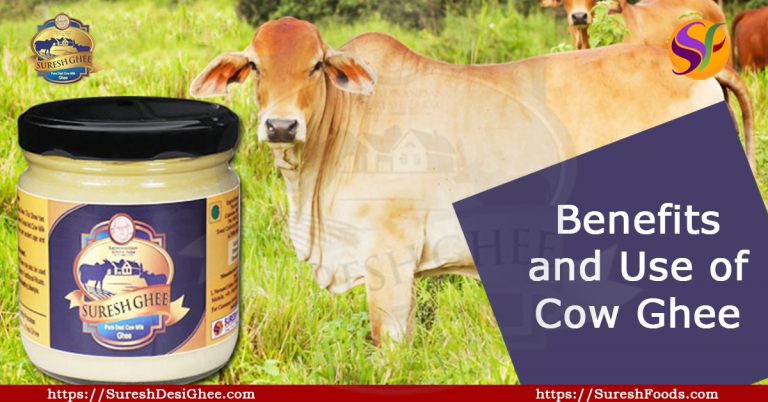

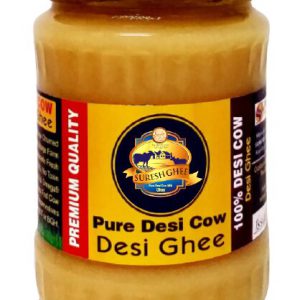
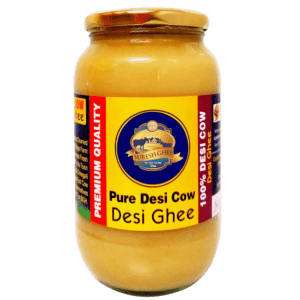
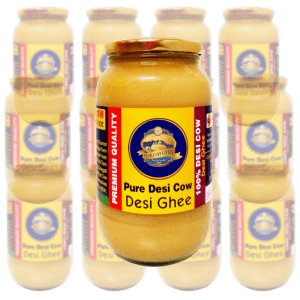
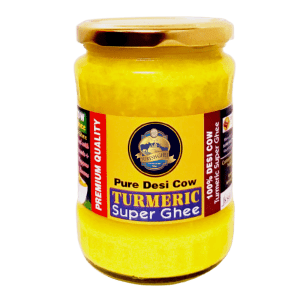
 WhatsApp us
WhatsApp us
Naveen m...